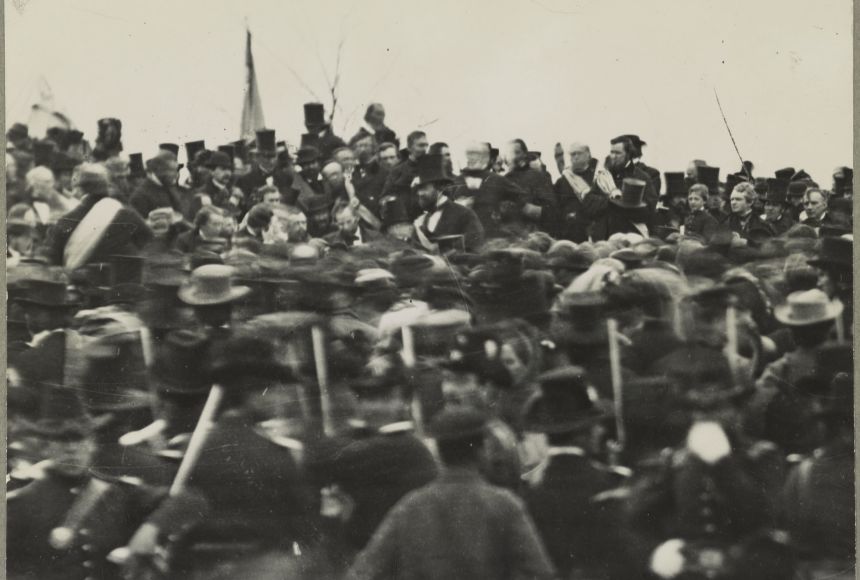Today, Abraham Lincoln's Gettysburg Address is legendary, and possibly the single most famous statement by a United States president. However, on November 16, 1863, the famous speech did not yet exist as we know it. Nor did it impress everyone who heard it at the time.
The Bloodiest Battle
The Battle of Gettysburg, in July 1863, was the bloodiest battle of the Civil War, with massive casualties on both sides. Over 50,000 soldiers were killed or wounded, and about 8,000 of those died on the battlefield or soon after. Thousands of soldiers were buried in shallow graves on the field where they fell.
Eventually, these graves fell into bad condition. Governor Andrew Curtin of Pennsylvania arranged to set apart a portion of the battlefield for a national cemetery to house and honor the dead Union soldiers. The site was to be dedicated on November 19, four and a half months after the battle.
President Abraham Lincoln accepted an invitation to give a short speech at the dedication ceremony. Edward Everett, a nationally famed speaker, was to give the main speech. On November 17, 1863, the day before he traveled to Gettysburg, Lincoln spent time writing his remarks in his White House study.
Lincoln Works on His Speech
The next day, Lincoln traveled by train to Gettysburg. He stayed at the home of David Wills, who had suggested creating the National Cemetery at Gettysburg. Lincoln described to his Attorney General James Speed in 1864 how he had asked to be alone for a time, when he continued work on the speech.
The dedication ceremonies began on November 19, 1863, with a procession from the town to the graveyard. Lincoln, Everett, and the other dignitaries present took their places upon a platform, and then the prayers and speeches began.
Everett delivered a polished, classical speech, opening with a mention of the defense of Athens in ancient Greece. Speaking from memory, he described the progress of the battle in detail. Everett compared the war to various historical rebellions in Europe and reiterated the importance of victory to the Union. His audience, in a period when people were used to listening to long speeches, was reported to maintain "breathless silence." Then, President Lincoln arose and made his brief remarks, concluding the ceremony.
"The Central Idea ... in Two Minutes"
The next day, Everett wrote to Lincoln, complimenting him on the speech: "Permit me also to express my great admiration of the thoughts expressed by you. ... I should be glad, if I could flatter myself that I came as near to the central idea of the occasion, in two hours, as you did in two minutes."
Not everyone was equally impressed by the speech. Across the nation, the newspaper editors of the day admired or dismissed Lincoln's speech, depending upon their political orientation. The Chicago Tribune enthused, "The dedicatory remarks by President Lincoln will live among the annals of man." Meanwhile, the competing Chicago Times mocked, "The cheeks of every American must tingle with shame as he reads the silly, flat, and dishwatery utterances." The Providence Journal wrote that Lincoln's address could not have been a "more admirable speech." The Harrisburg Patriot and Union, however, called it "silly." The paper retracted this assessment in 2013 upon the 150th anniversary of the Gettysburg dedication.
Lincoln's Work Survives
After Lincoln's death, his private papers passed to his secretaries, John Nicolay and John Hay. The papers included two copies of the Gettysburg Address in Lincoln's handwriting, each with slightly different wording. They came to be known as the Nicolay copy and the Hay copy. Lincoln made three other copies during his lifetime. Beginning in the 1870s, historians argued over which copy was the original draft. Most now agree that the document known as the "Nicolay copy" was the earliest draft, which Lincoln began at the White House, revised in Gettysburg, and carried in his hand while he spoke. It remained in the Nicolay family until the first half of the 20th century, when it was given to the Library of Congress.
The Nicolay and Hay copies are stored in the Library of Congress using advanced document preservation technology. An argon gas atmosphere prevents the paper from decaying. Lincoln's words survive in countless print and digital copies, too. They also survive in the minds of the many Americans who can recite the speech from memory.

